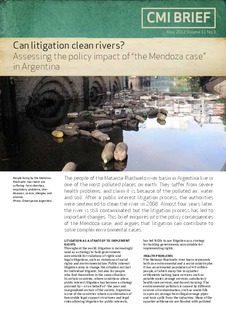| dc.contributor.author | Staveland-Sæter, Kristi | |
| dc.date.accessioned | 2018-01-04T08:18:43Z | |
| dc.date.available | 2018-01-04T08:18:43Z | |
| dc.date.issued | 2012-05-25 | |
| dc.identifier | oai:www.cmi.no:4467 | |
| dc.identifier.citation | Bergen: Chr. Michelsen Institute (CMI Brief vol. 11 no. 3) 4 p. | |
| dc.identifier.issn | 0809-6732 | |
| dc.identifier.uri | http://hdl.handle.net/11250/2474904 | |
| dc.description.abstract | The people of the Matanza-Riachuelo river basin in Argentina live in one of the most polluted places on earth. They suffer from severe health problems, and claim it is because of the polluted air, water and soil. After a public interest litigation process, the authorities were sentenced to clean the river in 2008. Almost four years later, the river is still contaminated, but the litigation process has led to important changes. This brief enquires into the policy consequences of the Mendoza case, and argues that litigation can contribute to solve complex environmental cases. | |
| dc.language.iso | eng | |
| dc.publisher | Chr. Michelsen Institute | |
| dc.relation | CMI Brief | |
| dc.relation | 3 | |
| dc.relation.ispartof | CMI Brief | |
| dc.relation.ispartofseries | CMI Brief vol. 11 no. 3 | |
| dc.relation.uri | https://www.cmi.no/publications/4467-can-litigation-clean-rivers | |
| dc.subject | Argentina | |
| dc.title | Can litigation clean rivers? Assessing the policy impact of "the Mendoza case" in Argentina | |
| dc.type | Report | |
